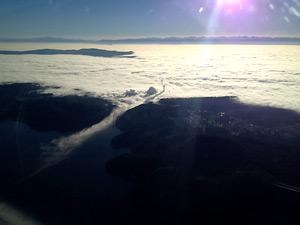Drier than usual conditions on the coast this winter are raising concerns about the amount of snowfall and possibility for drought-like conditions this summer.
Vanessa Ede at Powell River Weather Station said that precipitation this month has been almost half of normal levels. The station recorded 88 millimetres of rain in January and the monthly average is well over 150 millimetres, she said.
“It’s another month that we’ve been really low on precipitation,” said Ede.
Powell River had 36.7 hours of sunshine and 11 days of fog in January.
“Months are not always on the average,” she added. “Sometimes it’s really below and sometimes it’s really high.”
Debbi Stanyer, water resource and environment manager for Brookfield Renewable Power, said the power company will conduct its annual snowpack assessments at the head of Powell Lake at the end of March. She commented that at this point, based on anecdotal information, the situation “does not look very good.”
“It’s definitely been a strange year,” said Stanyer. “Hopefully we get some snow.” Mount Washington Alpine Resort on Vancouver Island closed its operations indefinitely due to a lack of snow on Wednesday, January 29.
The cumulative snowfall on the ski hill has been under 150 centimetres this season. The resort is used to having a snowpack of at least 250 centimetres by this point in the winter and an average annual snowfall of 12 metres is usual for the mountain, said a resort spokesperson.
According to the BC ministry of environment, Vancouver Island mountains have received only seven per cent of the normal amount of snowfall this winter and the south coast has received 37 per cent. Conversely, BC’s north and northeast have seen higher than normal snowfall this winter.
The BC River Forecast Centre estimates that by early January generally 50 per cent of a region’s annual snowpack has accumulated.
Scientists at the centre are watching the snowpack levels in the southwest of the province and are concerned about the effect the levels will have on the amount of water that will melt and feed rivers and lakes.



